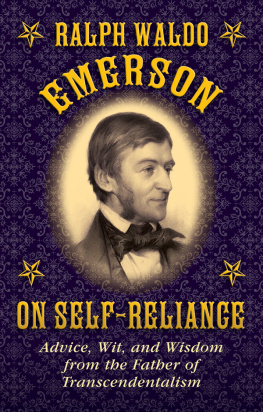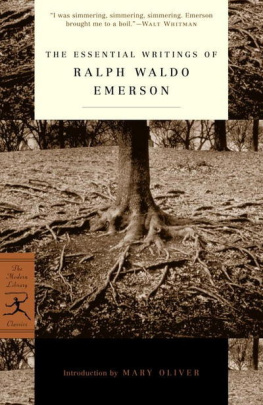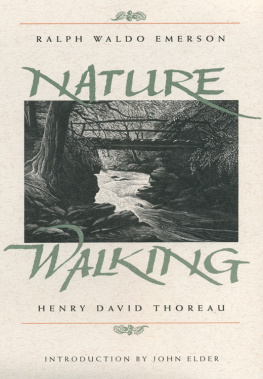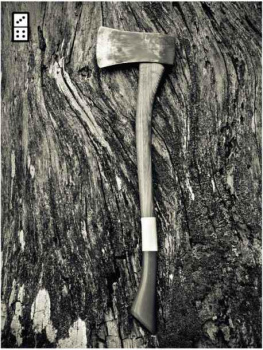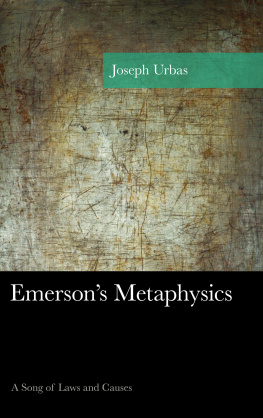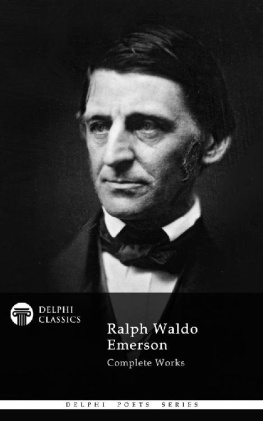Ralph Waldo Emerson - The Portable Emerson (Penguin Classics)
Here you can read online Ralph Waldo Emerson - The Portable Emerson (Penguin Classics) full text of the book (entire story) in english for free. Download pdf and epub, get meaning, cover and reviews about this ebook. year: 2014, publisher: Penguin, genre: Science. Description of the work, (preface) as well as reviews are available. Best literature library LitArk.com created for fans of good reading and offers a wide selection of genres:
Romance novel
Science fiction
Adventure
Detective
Science
History
Home and family
Prose
Art
Politics
Computer
Non-fiction
Religion
Business
Children
Humor
Choose a favorite category and find really read worthwhile books. Enjoy immersion in the world of imagination, feel the emotions of the characters or learn something new for yourself, make an fascinating discovery.
- Book:The Portable Emerson (Penguin Classics)
- Author:
- Publisher:Penguin
- Genre:
- Year:2014
- Rating:4 / 5
- Favourites:Add to favourites
- Your mark:
- 80
- 1
- 2
- 3
- 4
- 5
The Portable Emerson (Penguin Classics): summary, description and annotation
We offer to read an annotation, description, summary or preface (depends on what the author of the book "The Portable Emerson (Penguin Classics)" wrote himself). If you haven't found the necessary information about the book — write in the comments, we will try to find it.
The Portable Emerson (Penguin Classics) — read online for free the complete book (whole text) full work
Below is the text of the book, divided by pages. System saving the place of the last page read, allows you to conveniently read the book "The Portable Emerson (Penguin Classics)" online for free, without having to search again every time where you left off. Put a bookmark, and you can go to the page where you finished reading at any time.
Font size:
Interval:
Bookmark:

PENGUIN  CLASSICS
CLASSICS
THE PORTABLE EMERSON
RALPH WALDO EMERSON was born in 1803 in Boston. After beginning his career as a teacher and then becoming a Unitarian minister, he later became known as a lecturer, an essayist, a poet, a philosopher, and an abolitionist. His philosophy, developed during a trip to Europe on which he met Coleridge, Wordsworth, and Carlyle and imbibed the ideas of Romanticism, championed the importance of nature and individuality. A perpetual idealist, he urged his audiences to break from the staid ideas of Continental philosophy and to see the world with fresh eyes. In his first publication, Nature (1837), the foundational text for transcendentalism, Emerson prioritized the vastness of nature over civilization, and urged his readers to accept fully the truths and beauty emanating from nature. Writing at a time when America was ready for a new intellectual tradition to go along with its relatively newfound independence, Emersons ideas overwhelmingly became the mind-set of a nation struggling to forge its own identity. He died of pneumonia in 1882 and was buried in Concord. One eulogist called him the teacher, the inspirer, almost the conscience of thousands of Americans.
JEFFREY S. CRAMER is curator of collections at the Thoreau Institute at Walden Woods. He is the editor of the award-winning Walden: A Fully Annotated Edition, I to Myself: An Annotated Selection from the Journal of Henry D. Thoreau, The Maine Woods: A Fully Annotated Edition, and The Quotable Thoreau. For Penguin Classics, he is the editor and introducer of The Portable Thoreau.

PENGUIN BOOKS
Published by the Penguin Group
Penguin Group (USA) LLC
375 Hudson Street
New York, New York 10014

USA | Canada | UK | Ireland | Australia | New Zealand | India | South Africa | China
penguin.com
A Penguin Random House Company
The Portable Emerson edited by Carl Bode in collaboration with Malcolm Cowley published by The Viking Press 1946
This new compilation published in Penguin Books 2014
Selection, introduction, and notes copyright 2014 by Jeffrey S. Cramer
Penguin supports copyright. Copyright fuels creativity, encourages diverse voices, promotes free speech, and creates a vibrant culture. Thank you for buying an authorized edition of this book and for complying with copyright laws by not reproducing, scanning, or distributing any part of it in any form without permission. You are supporting writers and allowing Penguin to continue to publish books for every reader.
LIBRARY OF CONGRESS CATALOGING-IN-PUBLICATION DATA
Emerson, Ralph Waldo, 18031882.
[Works. Selections]
The Portable Emerson / Ralph Waldo Emerson; edited with an introduction by Jeffrey S. Cramer.
pages cm. (Penguin Classics)
ISBN: 9780698155688
I. Cramer, Jeffrey S., 1955 editor. II. Title.
PS1602.C73 2014
814'.3dc23
2014017163
Version_1
To
Marc Cramer
You carry your fortunes in your own hand.
EMERSON, IN HIS JOURNAL, 1828
To my editor at Penguin, Elda Rotor, for seeing the need for a new edition of The Portable Emerson, first edited by Mark Van Doren in 1946 and reedited by Carl Bode in 1977.
To the Ralph Waldo Emerson Memorial Association for permission to include the selection from Emersons correspondence.
And to my familyJulia, Kazia, and Zofor sharing our home with yet another Transcendentalist.
THE PORTABLE EMERSON
The Active Soul
To believe your own thought, to believe that what is true for you in your private heart is true for all men,that is genius.
EMERSON IN SELF-RELIANCE
I often say of Emerson, Walt Whitman eulogized half-a-dozen years after Emersons death,
that the personality of the manthe wonderful heart and soul of the man, present in all he writes, thinks, does, hopesgoes far towards justifying the whole literary businessthe whole raft good and bad, the entire system. You see, I find nothing in literature that is valuable simply for its professional quality: literature is only valuable in the measure of the passionthe blood and musclewith which it is investedwhich lies concealed and active in it.
Emerson would agree. As he wrote in his journal of 1845, Writing should be the settlement of dew on the leaf, of stalactites on the wall of the grotto, the deposit of flesh from the blood, of woody fibre in the tree from the sap.
Like Henry David Thoreau, who, in Walden, wanted to wake his neighbors up, Emerson said of his neighbors while in the midst of writing his first book, Nature: They want awakening. Get the soul out of bed, out of her deep habitual sleep, out into Gods universe, to a perception of its beauty, and hearing of its call, and your vulgar man, your prosy, selfish sensualist awakes, a god, and is conscious of force to shake the world.
Emerson did not want a generation of disciples, of followers, but of original thinkers. I have been writing and speaking what were once called novelties, for twenty-five or thirty years, and have not now one disciple. Why? Emerson asked in 1859:
Not that what I said was not true; not that it has not found intelligent receivers but because it did not go from any wish in me to bring men to me, but to themselves. I delight in driving them from me. What could I do, if they came to me?they would interrupt and encumber me. This is my boast that I have no school & no follower. I should account it a measure of the impurity of insight, if it did not create independence.
Those thought of as disciples, such as Thoreau or Margaret Fuller or Amos Bronson Alcott, were appreciated by Emerson for their originality and perception, their ability to alter my state of mind,
Between May 25, 1803, when he was born without ceremony in the First Church parsonage in Boston to Reverend William and Ruth Haskins Emerson, and April 27, 1882, when the bell of the First Parish in Concord tolled seventy-nine times announcing his death from pneumonia, Ralph Waldo Emerson had become one of Americas leading intellectuals, earning him the epithet, the Sage of Concord. Great geniuses have the shortest biographies, Emerson wrote. Their cousins can tell you nothing about them. They lived in their writings, and so their house and street life was trivial and commonplace.
Many who achieve prominence show no particular marks of distinction and promise in their early years. Emerson was no exception. He attended Boston Latin School and Harvard College as a satisfactory student, teaching after graduation in various schools until he decided to prepare for the ministry by attending the Harvard Divinity School. Once licensed to preach he found himself welcome at many pulpits around Boston; he finally accepted a position as colleague, or junior, pastorsoon promoted to pastorat the Second Church in Boston.
In December 1827 Emerson met Ellen Louisa Tucker. She was sixteen, with a sweet and kind disposition, and tubercular, a condition they either ignored or hoped she would overcome. They married in 1829. Sixteen months later Emerson was a widower. Emersons aunt, Mary Moody Emerson, wrote shortly before Ellens death, Waldo has borne so well his personal trialshas done & labored so much for his family that it is grievous to find him so triedhe is discouraged about this lovely flower who has so captivated his affections.
Font size:
Interval:
Bookmark:
Similar books «The Portable Emerson (Penguin Classics)»
Look at similar books to The Portable Emerson (Penguin Classics). We have selected literature similar in name and meaning in the hope of providing readers with more options to find new, interesting, not yet read works.
Discussion, reviews of the book The Portable Emerson (Penguin Classics) and just readers' own opinions. Leave your comments, write what you think about the work, its meaning or the main characters. Specify what exactly you liked and what you didn't like, and why you think so.


